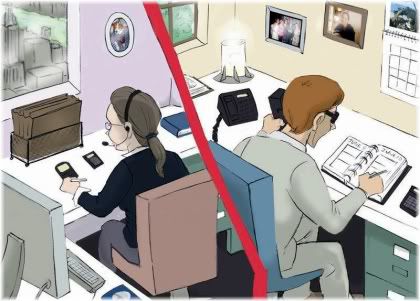Negotiating is a way of getting what you want by putting your point across in the most convincing way. In this sense, everyone is a negotiator, because we all have things that we try to “get” from other people and from life itself.
Whether or not you are able to get these things, largely depends on your negotiation skills. As if you possess good negotiation skills, you are much more likely to get what you want than someone who has poor negotiation skills.
Therefore, if you want to get more out of life, it’s worth spending some time learning how to become a better negotiator. In this article, you will find some helpful tips and advice on how you can do this.
Good Negotiators Prepare First
A key part of any negotiation is to know exactly what you want, what the other person wants and what you will be negotiating about. So let’s break down each of these now, and then cover each aspect in more detail throughout the rest of this article.
Know Yourself

In order to know what you want, you need to analyze your situation, and if it is relevant to do so, analyze your life. Once you know exactly what you want to achieve, your confidence will be dramatically improved when you negotiate with others.
What skills do you have?
It is important to make an assessment of your current skill set. For example, are you a good listener but a weak speaker? Do you have difficultly following a conversation? Or can you quickly understand what people are trying to say?
Asking yourself questions such as these will allow you to identify your strengths and weaknesses, in turn, this will allow you to use your strengths to your advantage and improve on your weaknesses thereby making you a much more effective negotiator.
What are your goals & objectives?
As well as knowing your skill set, it is also important to know your long-term goals. Sure, you may want to negotiate to get something, but how will getting it affect you in the long-term? Will getting what you think you want have a positive impact on your situation? Or will it have a negative impact?
These are things you need to take into consideration when negotiating, because you might just decide that what you think you want isn’t really the best option for you. As a result, you may then decide to try to negotiate for something else.
When are you at your best?
The final thing you need to be aware of, are the different negotiation situations. These are simply the times when you are likely to negotiate with someone, and so ideally, should occur when you are at your best.
For example, if you are a morning person, then there is little advantage in holding a business negotiation in the middle of the afternoon when you normally feel tired and sleepy. So be aware of your bodily rhythms and time your negotiations to those periods.
Know Your Counterpart

Any negotiation involves two parties. Therefore, in order to improve your overall negotiation skills and the techniques you use during negotiations, you need to think about who you are trying to negotiate with.
The best way to do this, is to research the person(s) beforehand with the aim of learning as much as you can about them. By carrying out this crucial step, you will be provided with a wealth of information that you can then use to your advantage.
Once you know a little bit about your counterpart, you can then tailor how you negotiate with them by targeting their likes and needs. This will help to build rapport, which will then increase how likeable you are perceived to be by others.
When researching a person’s background, look out for any similarities that you have with them. Later, when you negotiate, you will be able to use those similarities to help break the ice and make that person feel comfortable speaking with you.

Apart from the social benefits you get from knowing a person’s background, you will also get a feel for the type of person you are dealing with. This will then put you in a much better position to know which techniques you should be using.
For example, does the person who you are in negotiations with like to hear the facts and get to the bottom line? In this case, it would be wise to keep negotiations short and as detailed as possible.
If the person you are in negotiations with is a very friendly and talkative person, then a different technique would be called for. In this case, negotiations could be extended to accommodate for time to discuss unrelated issues for the purpose of rapport building.
The key point to remember, is that because everyone has a slightly different character, you must always be willing and able to change the type of negotiation technique that you use, because if you fail to adapt to different people, you will find it much more difficult to win someone over to your way of thinking.
Know Your Field of Interest

In addition to knowing yourself and the other person, you must also have an in-depth knowledge of your field of interest. By being aware of your field of interest, you will be able to use industry specific terms when you negotiate and will also know the true value of what you are trying to negotiate for.
This will allow you to communicate your points in the best possible way and thus increase your chance of conducting an effective negotiation. So make it your aim to become an expert in your field by constantly keeping up to date with the latest developments.
Researching Your Counterpart
One of the biggest and most common mistakes that people make when preparing to negotiate, is failing to research who they will be negotiating with.
Even if you are negotiating with a large corporation, that negotiation will still be carried out by people. You should therefore make it a top priority to find out as much as you can about them before you meet.
Do the Basics First

To start with, you should find out the name of the person or persons you will be negotiating with and their position within the company. This can easily be done by asking for a person’s name, or by requesting their business card.
Once you have someone’s name and title, you can quickly gain valuable information on them by doing a little bit of research before the negotiation begins.
For example, if you know someone’s position within a company, you will know how important they are within that company and some idea as to the power that person has to make decisions.
Once you know a person’s name, you can look them up in the phone book or on the Internet. This can tell you the neighbourhood a person lives in, the church they go to, where they are likely to shop and maybe even where their children go to school.
All of this information can then be used to create rapport later on when you begin the negotiation process. It will also help you to tailor your negotiation tactics so that they are more suited to the person you will be negotiating with.

The aim, however, is not to talk about everything you have discovered, but rather to increase your general knowledge of that person so that you know exactly who you are negotiating with.
If you find any skeletons in their closet, it’s generally best not to mention such information. However, if that information casts doubt on the upcoming deal, then you may choose to use that information by pulling out of the negotiation process entirely.
Finally, it’s worth bearing in mind that who your counterpart is will generally reflect how important the negotiation is to the other side.
For example, if you discover that you will be negotiating with the CEO of a company, then you will know that the negotiation is very important to the other side. As a result, this is likely to be a big deal with long-term future implications.
Who Are You Really Negotiating With?

Apart from knowing someone’s name and title, there are several other things that you should try to discover when carrying out research for a negotiation.
Corporate environment
Try to find out what company policies will apply to the type of negotiation you will be having. Are there any time constraints involved or pressures from the negotiators’ workplace?
Authority
Does the negotiator have the power to make decisions and close the deal? Or will they have to defer to someone higher up? If you are dealing with low-level members of a company, you may be wasting your time if they don’t have the power to do anything.
Whenever possible, always try to negotiate with people who have the authority to make decisions by themselves rather than having to refer to a senior member of staff.
If you are unsure as to whether this is case, call them on the phone and ask if they have to check with anyone else before they close the deal.
Clients
Who does the person you are negotiating with have to answer to? If you are able to make the client happy, then your chances of a successful negotiation will dramatically increase.
Their interests
In almost all negotiations, the person is interested in getting more money. If you can find a way to fulfil such interests, you will find the negotiation process a whole lot easier.
Incentives & attitudes
All negotiators have various incentives that can entice them to close a deal, and also attitudes that will affect how they view you and the negotiation process in general. If you can find out what these incentives and attitudes are, you should then find yourself in a much stronger negotiating position.
To help you discover the incentives and attitudes of the person that you shall be negotiating with, ask yourself the following questions:
Are there any incentives for the negotiator if they save money? How is the negotiator compensated? What will motivate them to get a result for this negotiation?
What is the negotiators’ attitude towards you? What is the company’s attitude towards the negotiator? What are the negotiators’ goals?
Additional information
Do you know anyone who has made similar deals with this negotiator in the past, such as friends, business associates or competitors? If not, can you find someone? What do other people have to say about this negotiator? What is your overall opinion of them?
Gaining such information from first-party sources can be an excellent way to determine what sort of a negotiator you are dealing with and the types of strategies that they like to use. If possible, get as much of this information as you can rather than relying solely on internet research.
Doing Market Research
The marketplace is your line of business, and doing market research means knowing your business inside out so that you can function more effectively in it. For this reason, failure to do adequate market research can often lead to poor business decisions and results.
Below we shall look at how you can research your marketplace with the aim of improving your overall knowledge and understanding of the areas that are critical to your business success.
The Internet

One of the best free ways to do market research, is on the Internet. Here, you can find trends, forecasts, analysis and reports that will provide you with the information you need to meet your business goals.
Although there are many search engines available on the Internet, Google tends to provide the best results, and so most people prefer to use this search engine when conducting their research. However, Yahoo, Bing and Ask also provide good results, so use whatever you feel the most comfortable with.
Since the web contains a vast amount of information, you should easily be able to do research in your field of interest. Start by performing a general search, and then narrowing that search down to specific areas.
Remember, market research is essentially a form of data collection, and therefore, you should try to collect as much relevant information as you can. However, whilst there is much market research data available on the Internet, you should not necessarily believe everything you see on the screen.
Anyone can put trends and forecasts on the web, and so in order to get accurate information, you should check your sources carefully and cross reference everything you find.
Generally, most market research data should be obtained from large, well established and trusted sites. But be aware that some of these sites may be sponsored by commercial entities, and so their information could be biased somewhat towards one direction.
The Library

The library is perhaps one of the most underused resources for market research analysis, despite the fact that it provides a wealth of free and valuable information.
One of its major advantages, is that unlike the Internet, you will know that the information you find is accurate and reliable because it has been properly researched by the author and vetted by the publisher.
As a result, it is generally a good idea to cross reference market data you find on the Internet with books or journals at the library. This is especially beneficial if your market research analysis concerns long-term trends and forecasts based on historical data.
Your Own Analysis

Whilst books and articles certainly are a valuable way of quickly gathering information, don’t be afraid to do your own research when analyzing your marketplace.
Very often, getting first hand experience of something can be far more beneficial in giving you a feel for what is going on than what you can get purely by reading about something.
For example, if you are trying to decide upon the best layout for your clothes store, then going into various stores and seeing things from a consumer’s perspective can give you much better information than what you would get just from reading a book.
So complement the market research you do online or in the library, by physically going out and exploring things for yourself.
Asking Questions

In order to do market research and get data that is relevant to you, it is absolutely essential that you speak to people in your field and ask them questions. It’s unlikely that you will understand everything you read the first time you see it, and so asking questions can help to give you the information that you may have overlooked.
This is especially important if your market research involves sales. In this case, asking consumer’s questions, such as by conducting focus groups, can provide you with specific and highly relevant information which you can then use to your advantage
Insider Reports

In any business, you need to know what people are prepared to pay for your product. By reading insider reports, you can find out this information and then apply it to your own business model.
For the most accurate market analysis data, don’t just rely on what your friends or work colleagues tell you. Read reports written by the people who tell merchants what they should charge. Go directly to the source the insiders use.
Regardless of the business that you are in, you should find a lot of market research analysis, because if there is money to be made in your business, you can be sure that someone has already investigated how profits can be maximized by selling your item at the optimal price.
In addition, consumer reports can be useful in gauging public opinion of a product, and they will also reveal results of tests, ratings and values. This can be useful for conducting broad range market analysis during your early research stages.
What Are Your Goals?
In order to achieve anything meaningful in life, you need to set yourself goals. If you don’t set goals, then you won’t know exactly what it is that you are trying to achieve. In terms of negotiating with someone, this is a big mistake.
All negotiations should therefore have clearly defined goals. These goals are what you will use to negotiate with, and what will guide you through the negotiation process. Having goals will also prevent you from getting less than you bargained for, especially when dealing with a skilled negotiator.
Setting Goals

One of the simplest ways to set goals for negotiations, is to brainstorm ideas on a sheet of paper. From these ideas, you should then select whatever is most important and relevant to the person you are trying to negotiate with. These will be your negotiation goals.
Knowing what you want beforehand will allow your negotiation to stay focused and on track, and prevent you from ending up with something that you didn’t want.
Generally speaking, the person with the strongest and clearest vision will tend to be the best negotiator. So make sure that person is you by setting yourself clearly defined and specific goals.
If you find yourself in a position where you are unable to decide upon your goals, ask yourself “what do I want to achieve by negotiating with this person?” The things you decide upon can then be turned into specific goals which you try to achieve.
Setting Limits

Setting yourself a goal is not the only thing that needs to be done when preparing to negotiate, because all goals should have limits. These limits are the absolute minimum that you will accept.
For example, if you are negotiating your salary and set yourself a limit of x amount of money, then you would try to negotiate for that amount and no lower.
If the other person can only offer you less that your limit, you should refuse and be prepared to walk away. Without setting limits on your goals, you could put yourself in a position where you end up getting far less than you originally intended.
This is because when you are in negotiations with someone, the idea is to get as much as possible of what you want, which often means giving the other person as little as possible of what they want.
So if you start to negotiate and haven’t set any limits on your goals, then the other negotiator will continue to take and take from you until you have nothing left. Limits will prevent this from happening and act as your safety net.
The Night & Morning Before You Negotiate
In order to negotiate at your best, you need to have a good night’s sleep so that you are rested and alert for the following day.
This is especially important if your negotiation is early in the morning, in which case, you should ensure that you have eaten a proper meal and are stress free before you begin negotiating.
Having adequate rest and being alert for negotiations will have the following benefits:
• Your concentration and ability to listen will improve.
• You will be more quick-witted and be able to respond to questions or attacks.
• You won’t rush the negotiation process so that you can get back to bed.
Below you will find some tips on what you can do to prepare the night and morning before you negotiate.
The Night Before

Learning to rest the night before a negotiation is an essential skill that needs to be mastered, because doing so will allow you to function more effectively the following day.
To help you get to sleep quickly, jot down all your thoughts about the upcoming negotiation onto a sheet of paper. Try to empty your mind by writing everything you can think of.
When you get to bed, avoid the temptation to think about your upcoming negotiation. As the more you think about it, the harder it will be for you to fall asleep and the less rested you will be when you wake up.
The only exception to this is if you are using mental visualization for a set period of time.
For example, if you visualize the upcoming negotiation in your head for 10-30 minutes as you lay in bed, then this can be beneficial in terms of helping you to review your strategy and the goals that you would like to obtain.
Prepare for a quick exit
On the night before a negotiation, it is a good idea to get everything ready that you will need for the following day.
To start with, prepare the clothes that you will be wearing and make sure that everything is laid out so that you get dressed quickly. Also, prepare any documents or notes that you will need to take with you so that you are not searching for them in the morning.
The idea is to have everything ready for you when you wake up, so that you can go to the negotiation room stress free and on time.
The Morning Before

The time of day that you will be negotiating will determine how much extra preparation you can do.
However, regardless of when your negotiation starts, you should have already done most of your preparatory work the previous night. Any extra you do should just serve to refresh your mind of key details.
If your negotiation is early in the morning, make sure that you leave yourself enough time to get yourself ready and to do any extra work that needs to be done. Avoid getting up too early though, or at a time which you are not used to, because otherwise you may find that your performance suffers as the day progresses.
If your negotiation is later in the day, do not become complacent and feel as though you have lots of time to kill. Use that time wisely by conducting additional research and by reviewing your strategies and goals.
Seating Arrangements
Seating arrangements are a very important aspect of any negotiation process, so it’s not something that you should leave to chance. Where you sit can not only affect how well you negotiate, but also how well you communicate and how much of an impact you will have.
Below you will find some of the things that you should take into consideration.
Sit Close to Key People

During a negotiation, there will be certain people who you need to consult with quickly and in private. You should therefore make sure that you are seated next to these people, as otherwise you run the risk of disturbing the meeting.
Distance Yourself From Conflict

The person you will be conflicting with is usually your opposite on the other negotiating team.
For example, if you are the team leader, then you are likely to have the most conflict with the other team leader. Try to sit opposite that person, and if possible, sit off centre by a chair or two to lessen the confrontational effect.
Stay Close to Key Areas

Sometimes when you are negotiating, you need to use the speaker phone or consult with people who are outside of the room. In this case, being seated near a phone or door is an extremely advantageous position to be.
Those closest to a phone for example, will be able control its use, whilst those nearest to the door will be able to control who enters or leaves the room.
Avoid Glare From Windows

If you are in an office that has a lot of windows, you may be exposed to heat or glare during the negotiation process. Both of these can make negotiating uncomfortable, which can then adversely affect your overall performance.
If you feel uncomfortable negotiating in the environment you are in, politely request to continue your negotiation in another room.
However, be aware that in some instances, your uncomfortable environment may actually be part of the other negotiating teams tactic, and so they may not be willing to change locations unless you really push for it.
Salary Negotiations

Salary negotiations usually occur in your boss’s office, and so you probably don’t have much choice as to where you sit.
You may be able to get around this though, if you can begin your salary negotiation in an area where you do not normally sit to receive assignments. For example, if your boss has a conversation area, or another seat such as a sofa, try to move your salary negotiation to those areas.
This will help to relax your boss by communicating with them on a more personal level, and not having a large object such as a desk separate you.
If your boss is firmly seated behind a desk, begin your salary negotiation standing up and only sit down when you are asked to. This will show greater self-confidence on your behalf.
When you finally do sit down, continue the negotiation of your salary but pull the chair slightly out of its regular position, such as to the left or to the right of where it normally is.
This will make a statement that the conversation you are now having is a negotiation, and is different from the normal routine of your boss assigning you a task to do. Whatever you do when negotiating for your salary, always make sure that you are at the same height as your boss or higher and never be lower than they are.
If you have to look up to your boss when speaking to them, you will shift the balance of power to them thereby putting yourself in a much weaker negotiating position.
Making a Good First Impression
One of the most important times of a negotiation is when you first enter the negotiating room. How you enter will set the tone for the rest of the meeting, even if you are not the person who is in charge of it.
Enter in the wrong way and you may appear tired, lacking in assertiveness or as someone who has low levels of self-confidence.
All of these things can then work against you during the negotiation process, thereby making it much harder for you to successfully negotiate your wants and needs.
Below you will find some simple tips on how to make a good first impression when negotiating.
Clear the Air

If a previous negotiation ended on a bad note, don’t automatically expect it to be forgotten the next time you negotiate. Otherwise, there is always the risk that previous unrelated issues may disrupt your current negotiating session.
You should therefore aim to resolve previous issues upfront before you begin negotiating again, because if you can resolve those issues, then the negotiation process won’t be clouded with ill feelings from the past.
Your Personality

Before you enter the negotiating room, or pick up the phone to negotiate, you need to have the right attitude, an attitude that is ready for the negotiation and is full of energy. You should know what you want to achieve, and be confident that you are going to get it.
In other words, before you begin negotiating you need to have an attitude that is ready for a successful negotiation. Think of this personality as your alter ego, someone who you transform into so that you can get the job done.
Entering the Room

If you are entering a room that has other people in it, stand up straight with your chest slightly elevated. Smile, make direct eye contact and individually greet each member in the room no matter what their position is.
Your aim is to appear as a confident, positive and friendly individual, because this will increase the chances of those people liking you. Once someone likes you, they will find it easier to trust you, will trust you sooner and feel more relaxed around you.
All of these are key ingredients for creating rapport as you negotiate, which as you probably already know, is an extremely valuable skill to have.
Phone Negotiations

If you are preparing for a negotiation on the phone, you must make sure that you have a positive, friendly and confident attitude just as you would in a face-to-face negotiation. However, because the other person can only hear your voice, you need to pay extra attention to how you use it.
A good tip for effective communication on the phone, is simply to smile. Even though the other person can’t see you, your smile will be conveyed to them through the sound of your voice.
In fact, most facial expression are transmitted over the phone as they all alter how you speak. So by animating your face, you can automatically animate your voice and make it seem more interesting to the listener.
Make Sure Everyone is Ready

If someone is missing from the negotiation, you face the dilemma of whether or not to start the meeting.
If you choose to start the meeting yourself, and fill in the person who is missing later on, you will raise your perceived status within that group because you are displaying assertiveness. This can work in your favor throughout the rest of the negotiation.
However, whether or not you choose to start the negotiation, really depends on who is missing and who you are in negotiations with. If it is the boss who is missing, then starting to negotiate without them may not be the wisest move on your behalf unless they have specifically asked you to do so.
In some cultures, it is considered rude to begin negotiations without everyone being present, and so in this case, it would be better to wait until everyone has arrived.
State the Purpose of Your Meeting

Before you begin your negotiation, it is worth briefly summarizing why you are here and the main points that you will be discussing throughout the meeting.
This outline helps to set the tone for the negotiation, and will keep everyone focused on the main issues so that you can get right down to business.
Make Sure Everyone is in Agreement

An important part of a successful negotiation is to ensure that everyone has agreed upon the issues set out in the agenda.
You should therefore try to gauge how others feel about it, so that you can start your negotiation with all members in agreement as to how it should proceed.
Acknowledge Attitudes and Feelings

If you can acknowledge how people feel about your proposal, and any objections they may have, you can help to establish empathy from the start of the meeting. This will help you to close the deal later on by making you appear considerate of their wants and needs.
Stick to Your Agenda

The purpose of having an agenda is to ensure that your negotiation stays on track and covers the important points that you want to discuss. So start the beginning of the meeting according to your agenda, because if you deviate from it at the start, you will find it much more difficult to regain control later on.
If you are working from a set written agenda, make sure that everyone has a copy of it and put a time limit on each item. Doing so will help to prevent you from lingering too long on one issue and not leaving enough time to negotiate other issues.
Communicating Your Message
Communication skills are fundamental to conducting good negotiations, and although they can take time to perfect, once you have mastered the art of effective communication your ability to successfully negotiate with others will be significantly improved.

During a negotiation, everything about you will either help or hinder you. This is why it is extremely important for all negotiators to be very clear in expressing exactly what they mean. Whilst this may sound easy, many people do not realize that there is more to their communication than just what they are saying.
For example, during a negotiation your body language, tone of voice and the words you use all communicate certain things about you. If each of these are not congruent (i.e. are not giving off the same message), then effectively negotiating with someone will be difficult because you will not appear to be genuine or believable.
A negotiator who is able to communicate clearly with their body and voice however, is likely to be far more successful because the recipient of their message will know exactly what they saying, and more importantly, believe it.
How clearly do you communicate?
In order to accurately assess how clearly you communicate, it would be worth your time to ask other people how well they understand what you say. Do you get to the point? Do you waffle? Are they able to grasp the meaning of your message?

All of this could prove to be valuable feedback, which, if acted upon, could vastly improve your overall negotiation skills and how effective you are as a negotiator.
Keep your promises
If you make a commitment to someone, make sure that you fulfil that commitment because people who constantly break promises send off negative non verbal signals. These signals tell a person that you cannot be trusted or that you are unreliable, which will then only work against you during the negotiation process.
Question for clarification
If during your negotiations you are unclear as to what a person has said, or you are unsure if they have understood what you have said, always ask and answer questions to clarify key points. This will help to avoid confusion, and make the whole negotiation process run a lot smoother.
Listening to What is Said
Listening is a skill that you absolutely must develop to a high level, because if you have poor listening skills then you will also have poor negotiating skills. Whilst most people think that they have good listening skills, the only accurate way to assess this is to ask other people who you communicate with on a regular basis.
Ideally, this is something that you should ask as many people about as possible. Doing so will give you a diverse range of feedback which you can then use to improve how well you listen to others.
Why Listen?

Before you start to negotiate with someone, you should have a good idea of the things that you want to negotiate about. During your negotiations, you should therefore listen carefully when these topics are discussed.
The idea is to get as much information as you can from the other person, because this information will allow you to change the strategies and techniques you use so that they are better suited to the type of person that you are negotiating with and the situation that you are in.
A simple way to improve your listening skills, is to expect to find something of value in what the other person has to say. A certain key piece of information that will give you the advantage you need. This might be something related to your business, a weakness you see in them or some area of similarity which you can use to create rapport.

You will know if you are listening well because the negotiation process will flow smoothly and naturally from subject to subject.
If, however, your negotiations feel awkward or there are difficulties in communicating, then use that as a sign that you are not listening enough.
Ask questions
Listening involves more than just being quiet and hearing what the other person is saying. Since any negotiation involves communication between two parties, you must also be able to ask the right questions to gather more information.
A key point to remember when asking questions, is to make sure that you get the answer you were looking for.
Some people, for example, will try to avoid answering the question or give you a response which doesn’t really tell you anything. So if you don’t get the answer you want, keep on asking questions until you do.
Self Control
As a negotiator, there will be times when you need to pause and step back from the situation. These will usually be the times when your negotiation has reached an emotionally charged subject where things start to get heated. If you are not careful, situations like this could quickly spiral out of control.

The ability to step back from a heated negotiation, or even a heated discussion, is known as your “pause button”. Some people are able to use it more than others, whilst some people don’t even use it all.
There are many ways the pause button can be used during negotiations. For example, you may decide to have a break during an intense negotiation process, or you may simply choose to exercise silence should someone say something offensive to you or say something with which you do not agree.
How well you are able to use your pause button largely comes down to your level of self-control.
Why is self-control important?
The ability to control your emotions is an invaluable skill to possess, because if you can’t control yourself and the way you respond to others, then you are likely to end up saying something that you later regret.
For example, you may get angry at another person, shout at them, insult them or even walk out of the room. None of these actions are traits of a successful negotiator, and will not do you any favors at all.

Using your pause button will also allow you to communicate more effectively. If, for example, you are able to pause before you reply to a question, you will give yourself time to assess the situation and come up with the best possible response.
People who do not utilize pauses often make the mistake of blurting out the first thing that comes into their mind, which in most cases, could have been communicated in a much more effective manner.
Not being able to pause during negotiations can even result in you agreeing to deals too quickly, and then later realizing that you got the short end of the stick.
Identifying your “hot buttons”
There’s no doubt about it, if you want to be a successful negotiator then you must learn how to control your emotions and respond in a cool and calm manner, especially when you are in an intense negotiation.
To help speed up this process, think about what your hot buttons are. What makes you angry? What causes you to lose your temper? What causes you to feel afraid? What irritates you?
Being aware of your hot buttons will allow you to become a more controlled person, which will then lead to more effective negotiations on your behalf.
In addition to this, by controlling yourself when your hot buttons are pushed, you will be able to conceal those buttons from other negotiators who would otherwise try to use them to their advantage.
Dealing With Tough Negotiations
A simple negotiation is one that involves two people, whereas a complex negotiation can involve large groups of people with multiple items on the agenda.
Negotiations can also become complex when emotions are involved. For example, on the surface a salary negotiation may appear simple, but because it carries a lot of emotional weight behind it, the negotiation may draw on while you struggle to reach a successful conclusion.
Below you shall find some tips on how to improve your negotiation skills under different difficult circumstances.
Negotiating Internationally

International negotiations involve negotiating with people or organizations from across the world. One of the most challenging aspects of negotiating internationally, is the extra preparation that is required before you begin.
For example, when negotiating with a person from another country, you need to be aware of their cultural customs and how they are used to communicating. Failure to develop this cross cultural awareness, could result in ineffective communication, or worse, behavior that is considered rude or offensive.
Things to take into consideration when you negotiate with other cultures include:
• Differences in communication
• Attitudes towards conflict
• How tasks are completed
• How decisions are made
• Policies on disclosing certain types of information
• Body language
So in addition to your regular negotiation skills, always be aware of the traditions that exist in different countries, and don’t make the mistake of assuming that what is acceptable in your country is also acceptable in another country.
To help you with this process, research the country of the person who you are going to be negotiating with. This can be done by speaking to a native of that land, reading travel guides/books or by looking on the Internet. The more research you do, the better your international negotiation skills will become.
Male & Female Negotiations

Communication between men and women has changed a lot in recent years, as unlike in the past, women now frequently occupy top positions of power. However, this generally occurs only in westernized countries, as in the east, it is still very much a male dominated world.
Although the communication gap between the two sexes has narrowed, there are still important differences which are worth being aware of.
For example, women tend to talk a lot when they negotiate with men, and often interrupt them because women talk faster. In addition to this, when a woman negotiates with a man, she may be distrustful of what he says because of the way he communicates his message to her.
When it comes to men who negotiate with women, men can improve their negotiation skills by fully listening to a woman and taking what she says seriously.
Sometimes for example, a man will try to flirt with an attractive woman, which then leads her to believe that he is not interested in discussing business with her and is not taking what she says seriously.
Phone or Internet Negotiations

Technological advancements over recent years have forever changed the way that people negotiate and the negotiation skills they use. The invention of the phone and the internet for example, has enabled global negotiations to occur at a much more rapid pace than they used to.
However, whilst these inventions certainly have made things much more convenient, in some ways, they have also made things much more difficult.
One of the main reasons for this is due to the lack of non verbal communication. For example, if you are speaking to someone on the phone you obviously can’t see them which means that you can’t see their body language either.
As a result, your ability to communicate successfully using a phone or the internet, largely depends on your verbal abilities and how well you are able to speak without the use of non verbal cues.
If you feel that your verbal communication skills need improving, attend some speaking courses or listen to talk radio as both can be of tremendous benefit in helping you to more effectively communicate with people who you can’t physically see.
Negotiating at Home & Away
Whilst most people spend a lot of time thinking about their negotiation strategies, very few actually take into consideration the environment they will be negotiating in.
In general, there are two types of environments that you can negotiate in. Those which you are familiar with, and those which you are not familiar with. Each of these have their advantages and disadvantages, some of which we shall now discuss.
Negotiations In Familiar Territory

Negotiating on home turf, such as in your office or your study at home, can provide you with many advantages.
The most obvious being that since you already have all the information, equipment and staff at hand, you are likely to feel the most comfortable working in this type of environment. So if you are able to choose the venue of where your negotiation will be held, it’s usually best to try to negotiate on your home turf whenever possible.
However, negotiating on your home turf can have its disadvantages too, because as a good negotiator you must be able to apply your skills to any environment.
If you become used to negotiating only from your office for example, then you may find yourself feeling uncomfortable in unfamiliar territories which will then have an effect on how well you are able to perform.
It is also worth bearing in mind that negotiating in someone else’s office can very often be better for you, especially if your opponent likes to claim that they “forgot” to bring certain documents with them. By meeting in their office, you can easily neutralize this evasion tactic.
Negotiating in Someone Else’s Office

Whenever you visit someone else’s office, you can quickly gain a lot of information about them. For example, they may have pictures or awards that reveal their personal interests and family status. These are things that you could then talk about to help establish rapport.
The state of a person’s office can also tell you if they are a messy or neat person, their taste in furnishings, and often, how busy they actually are.
The location of a person’s office can reveal to you their relative importance within that company. Are they near the higher powered people in that organization, or is their office further away? Do they have a big office with lots of window space? Or a smaller darker office?
All of this information can help you to better understand who you will be negotiating with. The more you know about them, the better you will be able to relate to them, and the better you will be able to decide upon which negotiation tactics you are going to use.
The main disadvantage of carrying out a negotiation in unfamiliar territory is that your resources may be somewhat limited. Despite your best preparations, there are likely to be times when you need access to information which you don’t have at hand.
Since you are away from home, getting such information is going to be more difficult and will take longer. However, an experienced negotiator, who has someone on standby, should be able to deal with such situations in a timely manner.
Things Common to All Negotiations
When you negotiate a deal with someone, there will be specific needs and goals that you will have to satisfy. Your ability to do this will largely determine whether or not you have a successful negotiation.
Although your negotiation is likely to include specific factors related to your business or field of interest, there are certain things which are common to all negotiations.
These general factors can be equally as important, because like your specific needs and goals, they can either positively or negatively influence the negotiation process and the results you get. Below we examine some of these factors.
Time

As a general rule in any negotiation, if you are providing a service or product you expect to receive a certain amount of money for delivering it within a set time period. If however, you are asked to delivery things sooner, you should always be prepared to raise the price for doing so.
This is an area you can negotiate your demands quite easily, as most people will expect to pay more for quicker service. However, if you are unable to provide your product or service within the agreed upon time, expect your price to be negotiated down.
Quality

All customers have their own unique demands, and therefore, some may require your product or service to differ slightly from its original specification.
There is nothing wrong with meeting these demands, but you should be prepared to negotiate the price upwards if it will take you extra time to meet those specifications. Likewise, if you are asked to reduce the quality or functionality of a product, be prepared to have your price negotiated downwards.
Quantity

Generally speaking, you can expect to negotiate cost down if your customer is buying in bulk, as this will lower the price per unit.
If however, your customer makes such a large order that it will give them control of the market, you should raise your price instead. This is important because once someone has cornered the market, they will then control the price that you can charge them in the future.
There is also an added risk of taking very large orders. If for example, your customer leaves you, or the business fails, you could be left in a very serious situation if you had committed a lot of resources to meeting their order. So as the risk goes up, you should be prepared to negotiate the price up.
Start again if changes are made
Sometimes a customer will place a specific order with you, and then later change the specifications. It is very important at this stage to resume negotiations regarding cost, because once you agree to make one change for free, it will usually lead to more one way requests that will come at your expense.
Closing a Negotiation
There will be times during a negotiation when all parties involved have agreed upon the important terms, yet the negotiation still draws on and doesn’t seem to come to a close.
Usually, this is because of one person who is being difficult. A person who will try to negotiate with you to get what they want on every single issue, without being willing to give something up in return.
Other times negotiations may draw on because someone is trying to bully you, or trick you into giving up something you either can’t or don’t want to give up. Then you have times when someone acts bossy during a negotiation, thinking that they are right and you are wrong on every single issue.

If you find yourself in any of these situations, then one of the best things that you can do is to take a break. Having a break during a negotiation will not only allow you to regroup your thoughts and alter your negotiating strategy, but it will also allow things to calm down so that when you resume negotiations you will do so with a clear head.
Very often negotiations fail because people allow their emotions to get the better of them, which then causes them not to think or negotiate in a logical manner.
This can often be caused by negotiation strategies which frustrate you. For example, the other negotiator may constantly change their position, play good cop/bad cop or frequently leave the negotiation to consult with an invisible partner.
Again, allowing yourself time for a break will give you an opportunity to assess the situation with a clear head, and then change the strategies that you use when you resume negotiations. When you begin to negotiate again, listen carefully to what is being said and ask questions to help you get around any obstacles.
When should you close the deal?
Closing the deal is the climax of the negotiation process, and is the point where both parties have accepted terms that they are happy with. As a result, if you negotiate with someone and come to a satisfactory conclusion quickly, jump on that opportunity to seal the deal.
Far too often people allow negotiations to drag on and on even when both parties are happy with the terms. The danger in allowing this to occur, is that the terms may suddenly change and you may then have to begin negotiating again.
So always aim to close the deal as soon as both parties are happy with the terms. You can make a quick assessment of this simply by asking if they are happy, and if they are, agreeing to seal the deal.

Of course, not every negotiation will have such a smooth conclusion. This is especially true with business negotiations where lots of money is involved and someone is afraid of making a mistake by closing too early.
In this case, the best approach is to ask questions so that you can discover exactly what is holding back your negotiation from coming to a close. You can then use the feedback you get to work around the sensitive issues by helping the other party to solve their problems.
Remember, a good negotiator is someone who is able communicate the good points of their proposal clearly so that the other party can see the advantage of agreeing to your terms. If you can help people overcome any concerns or problems they may have with your proposal, you should find closing your negotiation a whole lot easier.
Videos
Reviewed – 28th March 2016